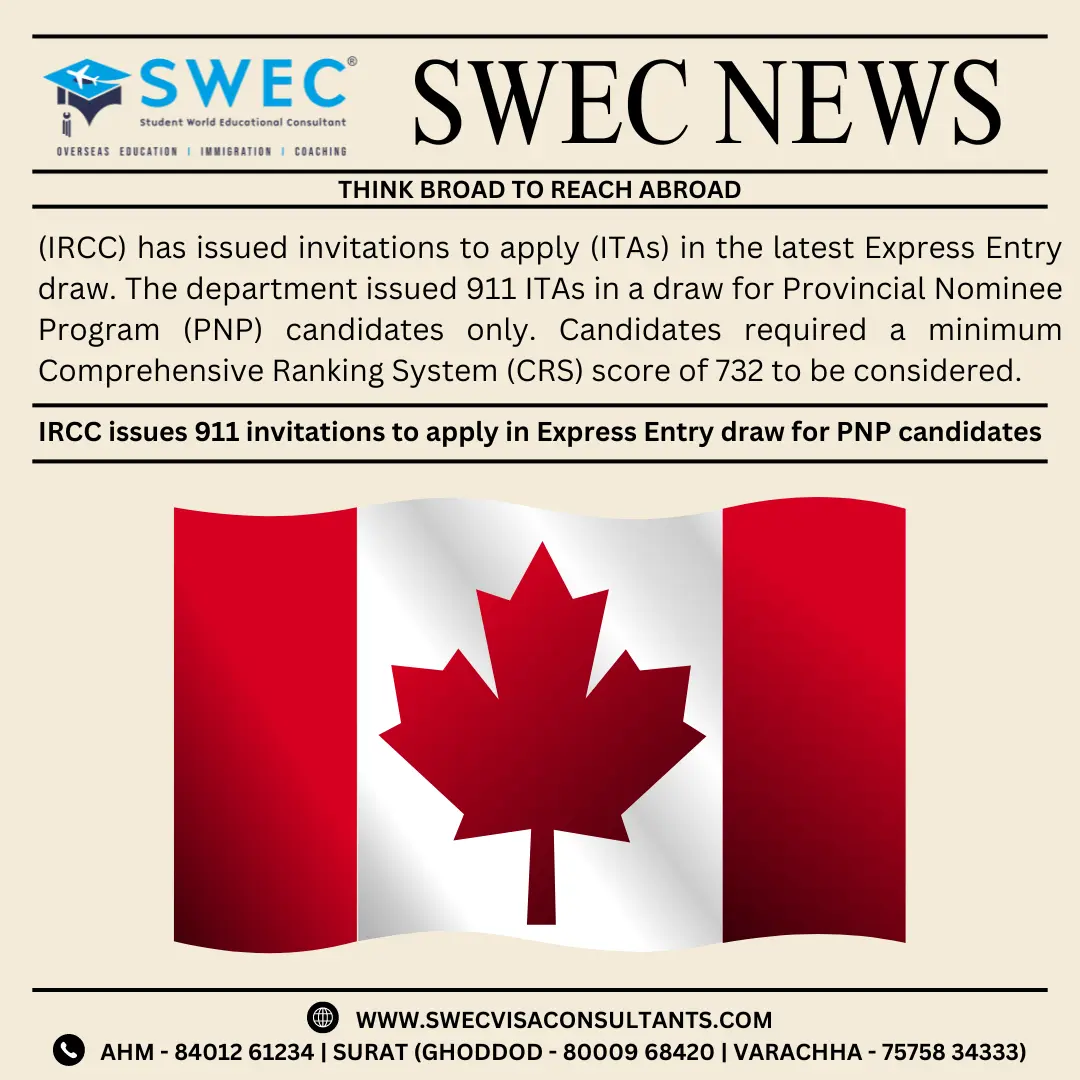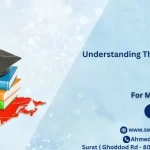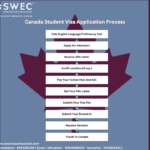Immigration, Refugees, and Citizenship Canada (IRCC) continues to streamline its immigration processes with targeted Express Entry draws, providing more focused opportunities for skilled workers. In the latest round, 1,000 invitations to apply (ITAs) were issued in a category-based draw aimed at candidates with French language proficiency. This move aligns with the Canadian government’s efforts to attract bilingual and French-speaking candidates to contribute to Canada’s cultural and economic diversity.
Details of the Latest Draw
In this recent Express Entry draw, candidates required a minimum Comprehensive Ranking System (CRS) score of 446 to be eligible for an ITA. The CRS is a points-based system IRCC uses to assess and rank candidates based on factors such as language skills, education, work experience, and age. The draw primarily focused on individuals who demonstrated proficiency in the French language, reflecting Canada’s ongoing commitment to fostering bilingualism and supporting francophone communities.
A Busy Summer for IRCC Draws
This draw follows a particularly active period for IRCC, which conducted 14 separate Express Entry draws throughout July and August. During this time, July set a record for the highest number of draws in a month since the Express Entry system was launched in 2015. Nine draws were conducted between July 2 and July 31, indicating the IRCC’s commitment to meeting its immigration targets and addressing labour market demands.
The most recent draw before this one took place on September 9th, which issued invitations to 911 candidates, specifically focusing on applicants under the Provincial Nominee Program (PNP). This pattern of multiple draws every other week has been adopted by IRCC to manage the influx of temporary residents and provide increased opportunities for those already residing in Canada to gain permanent residency.
Category-Based Express Entry Draws: A Focus on French Speakers
One of the key strategies IRCC has employed in recent times is the introduction of category-based selection draws. These draws allow IRCC to target candidates who meet specific economic and demographic needs, and French language proficiency is one of the six primary categories that the department has been focusing on. The other categories include healthcare occupations, STEM professions, trades occupations, transport occupations, and agriculture/agrifood sectors.
The emphasis on French speakers is part of Canada’s strategy to enhance its bilingual workforce, especially in provinces like Quebec and communities outside Quebec where French is a growing demographic. With the French language being a key asset, candidates with this proficiency enjoy a competitive edge in the Express Entry system, often benefiting from lower CRS cut-offs in these targeted draws.
Comprehensive Ranking System (CRS) Overview
The Comprehensive Ranking System (CRS) is central to the Express Entry application management system. Introduced in 2015, the CRS assigns candidates a score based on key human capital attributes. Points are awarded for various factors, including:
- Language ability (proficiency in English and/or French)
- Work experience in Canada or abroad
- Education levels attained
- Occupation within in-demand sectors
- Age (younger candidates generally receive higher points)
Candidates with higher scores are more likely to receive an ITA, but recent category-based draws have enabled those with specific skill sets, like French proficiency, to receive invitations even with lower CRS scores. This flexibility allows Canada to address its immediate labour market needs and demographic goals.
Enhanced Provincial Nominee Program (PNP)
Candidates in the Express Entry system may also be eligible for streams within the Provincial Nominee Program (PNP). This program allows Canadian provinces and territories to nominate candidates who meet local labour market needs. Those who receive a provincial nomination automatically gain an additional 600 CRS points, significantly boosting their chances of receiving an ITA in future draws.
The integration of PNP into the Express Entry system has created more pathways for skilled workers, especially those who may not meet the general CRS threshold but possess the skills and experience required by specific provinces.
Express Entry Summary of 2024 Draws
The Express Entry system has seen several draws throughout 2024, reflecting Canada’s dynamic immigration needs. Below is a summary of recent draw results:
| Date | Draw Type | Number of ITAs | Minimum CRS |
| September 9 | Provincial Nominee Program | 911 | 732 |
| August 27 | Canadian Experience Class | 3,300 | 507 |
| August 26 | Provincial Nominee Program | 1,121 | 694 |
| August 15 | French language proficiency | 2,000 | 394 |
| August 14 | Canadian Experience Class | 3,200 | 509 |
| August 13 | Provincial Nominee Program | 763 | 690 |
| July 31 | Canadian Experience Class | 5,000 | 510 |
| July 30 | Provincial Nominee Program | 964 | 686 |
| July 18 | French language proficiency | 1,800 | 400 |
| July 17 | Canadian Experience Class | 6,300 | 515 |
| July 16 | Provincial Nominee Program | 1,391 | 670 |
| July 8 | French proficiency | 3,200 | 420 |
| July 5 | Healthcare occupations | 3,750 | 445 |
| July 4 | Trade occupations | 1,800 | 436 |
| July 2 | Provincial Nominee Program | 920 | 739 |
| June 19 | Provincial Nominee Program | 1,499 | 663 |
| May 31 | Canadian Experience Class | 3,000 | 522 |
| May 30 | Provincial Nominee Program | 2,985 | 676 |
| April 24 | French proficiency | 1,400 | 410 |
| April 23 | General | 2,095 | 529 |
| April 11 | STEM occupations | 4,500 | 491 |
| April 10 | General | 1,280 | 549 |
| March 26 | French language proficiency | 1,500 | 388 |
| March 25 | General | 1,980 | 524 |
| March 13 | Transport occupations | 975 | 430 |
| March 12 | General | 2,850 | 525 |
| February 29 | French language proficiency | 2,500 | 336 |
| February 28 | General | 1,470 | 534 |
| February 16 | Agriculture and agri-food | 150 | 437 |
| February 14 | Healthcare occupations | 3,500 | 422 |
| February 13 | General | 1,490 | 535 |
| February 1 | French language proficiency | 7,000 | 365 |
| January 31 | General | 730 | 541 |
| January 23 | General | 1,040 | 543 |
| January 10 | General | 1,510 | 546 |
This year has demonstrated IRCC’s proactive approach to addressing economic demands through targeted immigration draws.
The Importance of French Proficiency in Canadian Immigration
The decision to focus on French language proficiency reflects a broader trend in Canadian immigration. French-speaking communities, particularly outside Quebec, are growing, and the government is keen on supporting these communities by attracting immigrants who can contribute to their development. This aligns with Canada’s long-term demographic goals, which include increasing the number of bilingual workers to foster national unity and economic growth.
Candidates proficient in French not only meet the linguistic needs of many provinces but also benefit from greater job opportunities, particularly in sectors where bilingualism is a critical asset.
Category-Based Selection and Future Trends
The category-based selection process introduced by IRCC in 2023 is designed to adapt to Canada’s shifting labour market and demographic needs. Currently, there are six main categories: healthcare, STEM, trades, transport, agriculture/agrifood, and French language proficiency. Each year, IRCC reviews these categories to ensure they align with the nation’s labour market priorities.
This flexibility allows Canada to remain competitive in attracting global talent, ensuring that immigration contributes to both short-term economic needs and long-term national growth.
Conclusion: Canada’s Strategic Immigration Approach
IRCC’s recent draw targeting French-speaking candidates is a testament to Canada’s strategic approach to immigration. By focusing on specific skills and linguistic capabilities, the country can attract immigrants who will not only fill labour market gaps but also contribute to the cultural diversity and bilingualism of Canada’s workforce. With continued draws and evolving immigration policies, Canada remains one of the most attractive destinations for skilled workers worldwide.
If you’re interested in applying for Express Entry or want to assess your eligibility, consider consulting with professional immigration experts like SWEC Visa and Immigration Services. Their team can guide you through the latest Express Entry changes and ensure your application meets all requirements for a successful outcome.
FAQs
Q1. What is the latest Express Entry draw for French speakers?
Ans1. The latest Express Entry draw conducted by Immigration, Refugees, and Citizenship Canada (IRCC) issued 1,000 invitations to apply (ITAs) to candidates with French language proficiency. This category-based draw required candidates to have a minimum Comprehensive Ranking System (CRS) score of 446.
Q2. Why did IRCC focus on French language proficiency in this draw?
Ans2. IRCC’s focus on French language proficiency aligns with Canada’s goal to increase the number of bilingual and French-speaking immigrants, contributing to the growth of francophone communities outside Quebec and supporting the nation’s cultural and economic diversity.
Q3. What is the minimum CRS score required for French speakers in this draw?
Ans3. The minimum CRS score required for French speakers in this specific Express Entry draw was 446.
Q4. How many Express Entry draws took place in July and August 2024?
Ans4. There were a total of 14 Express Entry draws conducted throughout July and August 2024. July broke the record for the highest number of draws in a month since the Express Entry system was introduced in 2015, with 9 draws between July 2 and July 31.
Q5. What was the most recent Express Entry draw before this one?
Ans5. The most recent Express Entry draw before this French-speaking candidate-focused draw took place on September 9, 2024. It issued 911 invitations and focused on candidates in the Provincial Nominee Program (PNP) with a minimum CRS score of 732.
Q6. What is the Comprehensive Ranking System (CRS) in Express Entry?
Ans6. The Comprehensive Ranking System (CRS) is a points-based system used by IRCC to rank and assess Express Entry candidates. It assigns points based on various factors such as language skills, work experience, education, occupation, and age. Candidates with the highest CRS scores receive invitations to apply for permanent residency.
Q7. What is the Provincial Nominee Program (PNP) in Express Entry?
Ans7. The Provincial Nominee Program (PNP) allows Canadian provinces and territories to nominate candidates from the Express Entry pool who meet their specific labor market needs. PNP nominees receive an additional 600 CRS points, significantly boosting their chances of receiving an ITA in future draws.
Q8. What is category-based selection in Express Entry?
Ans8. Category-based selection was introduced in 2023 by IRCC to target candidates with specific in-demand attributes, such as work experience in healthcare, STEM fields, trades, transport, agriculture, and French-language proficiency. These category-based draws generally have lower CRS score requirements compared to program-specific or general draws.
Q9. How does French proficiency benefit Express Entry candidates?
Ans9. French proficiency gives candidates an advantage in Express Entry because Canada is seeking to increase its bilingual workforce, especially in provinces outside Quebec. French-speaking candidates often benefit from lower CRS cut-offs in targeted draws for French language proficiency.
Q10. Can candidates with French proficiency also apply through Provincial Nominee Programs (PNP)?
Ans10. Yes, candidates with French proficiency can apply through the PNP if they meet the requirements of a particular province. A nomination from a province adds 600 CRS points, making it highly likely for the candidate to receive an ITA in a future Express Entry draw.
Q11. What are the six main categories for category-based selection in Express Entry?
Ans11. The six categories for category-based selection in Express Entry are:
- Healthcare occupations
- Science, Technology, Engineering, and Mathematics (STEM) professions
- Trades occupations (e.g., carpenters, plumbers, contractors)
- Transport occupations
- Agriculture and agri-food occupations
- French-language proficiency
Q12. Will IRCC change the categories for selection in the future?
Ans12. IRCC reviews the categories for selection annually. As labor market priorities and demographic demands evolve, the categories may be adjusted to ensure they align with Canada’s economic needs.





